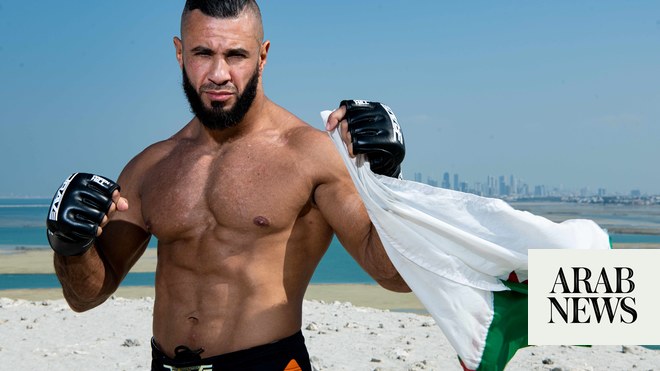The holy month of Ramadan, a time dedicated to fasting, prayer, reflection, and community, is of great importance to Muslims around the world. For mixed martial arts athletes, it has a profound impact on their daily lives.
To gain insight into how elite warriors balance honoring their faith and managing their careers, we spoke to officials from some of the top organizations around the world.
Muhamad Mokaev is a star in the UFC flyweight division, fresh off his 12th straight professional win with a unanimous decision over Alex Perez earlier this month. He is currently ranked 7th and on the verge of winning the title.
“My daily routine is simple,” he told Arab News. “We train for an hour to an hour and a half before iftar, then break the fast, visit the mosque around midnight, stay up until 4 a.m. or a little before, eat before sunrise, and then Wake up at the following time: 11 a.m. But the most important aspect is to focus on doing good deeds and look for opportunities to support charities because good deeds are multiplied,” he stressed.
Mokaev highlights the benefits of fasting, which is praised by sports scientists as a period that promotes recovery from the physical demands of mixed martial arts.
“We believe that fasting benefits us as athletes by promoting health. It cleanses our systems, allows our bodies to relax, rest, and improves our health without the need for dieting or weight loss.” It helps me recover,” he explained. “It's very important because we train hard. Additionally, fasting changes the way we think. We become more focused and generous about how to help those in need. It facilitates a deeper connection with our inner selves.”
Choosing to prioritize his beliefs, Mokaev made the decision to withdraw from UFC 300 on April 14th.
“Ramadan beats everything else,” the 23-year-old declared. “I speak not only for myself, but for all Islamic fighters. Our victory is ultimately given by the Almighty, so it takes precedence over competition. I cannot be counted out. Therefore, I cannot ignore this obligation for personal gain.”
Mokayev's journey from Buinaksk, Dagestan to England is a story of resilience. Despite facing personal challenges, including the death of his mother and living on just £5 (approximately $6.36) a day in a refugee camp, he remains unyielding in his pursuit of the UFC title. I keep it.
“Whether you win or lose, maintaining credibility is the most important thing. You can have a championship belt, but if you don't have respect and love, it's worth nothing,” he said.
ONE Championship competitor Shamil Gasanov takes a relaxed stance on Ramadan, seeing it as similar to the unique challenges of his sport.
“For fighters, Ramadan is not that difficult because they are used to weight loss plans and dietary restrictions,” said the fifth-ranked featherweight. “During Ramadan I mainly stay at home, visit the mosque and do some light training in the evenings. It gives my body a complete rejuvenation and, importantly, strengthens my spiritual connection. .”
Gasanov, nicknamed “Cobra,'' is motivated by a promise he made to his mother and aspires to win two world titles.

In the Professional Fighters League, Biaggio Ali Walsh, grandson of Muhammad Ali, echoes the sentiments of Ramadan, promoting the spirit of promoting personal growth despite the physical and mental challenges of fasting and training. It brings a unique journey.
“It's not normal,” Walsh said. “I'm fasting while training, so normally I can drink water, but when I'm fasting I can't drink water. It's tough mentally and physically, but we're all the same.” I do it for a reason: to draw closer to God.”
Walsh, who won a unanimous decision over Emmanuel Palacio in his professional debut in Riyadh in February, admits that Ramadan presents unique challenges, both physically and mentally. Despite the hardships, he finds solace in the deeper spiritual connections that developed during this time.

Holding a fight camp during Ramadan poses unique challenges, as experienced by Mohamed Saeed Maalem, who will headline Brave CF 81. As the match approaches on April 20, Mahlem faces the difficult task of balancing physical preparation with mental obligations.
“The biggest challenge is fighting big names like Elko Jun, so I need to work hard,” he said.
“It's hard to prepare for a fight during Ramadan. You're tired and weak, but another difficult thing is that you can't find a training partner to work hard with you. That's the main purpose of this camp. This is a matter of concern.”
Mahlem believes that, like most sports at the highest level, battles are determined by mentality and strength of will. If an athlete can endure a combat camp while being deprived of daily nutrition, he or she will gain a mental advantage over his or her opponent.
“Religion strengthens the mind and develops the resilience and perseverance essential in the pursuit of victory. I end up becoming like a lion. 100 times higher, and sometimes the anger numbers go up as well,” he said with a laugh.

